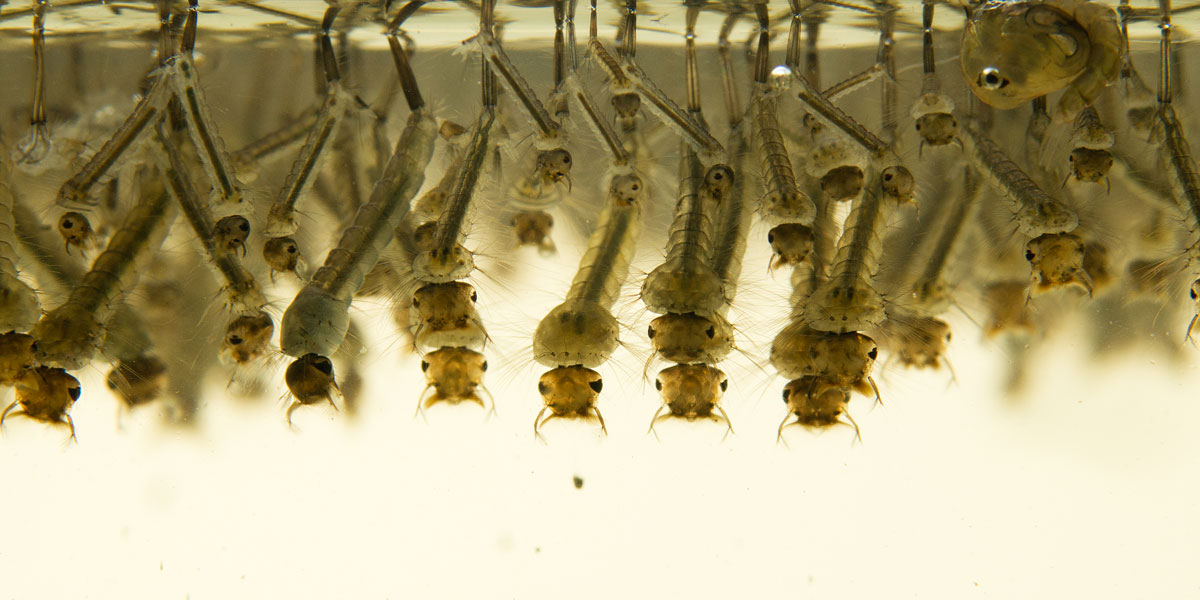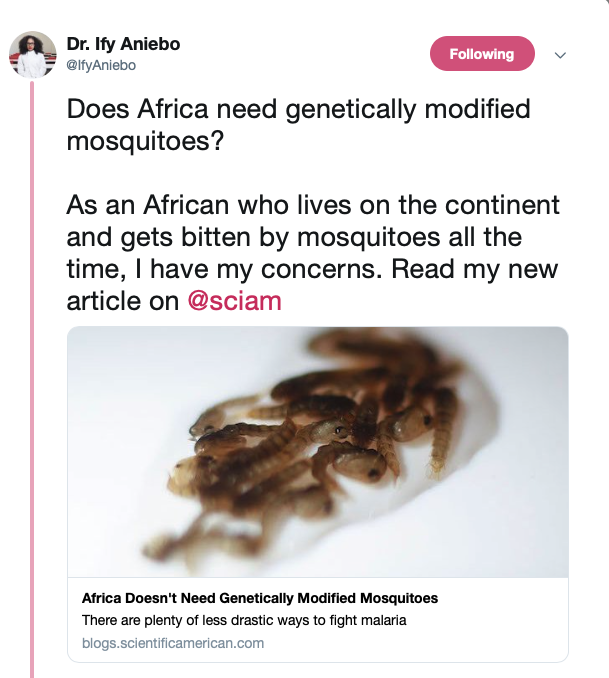
Their deployment is too hurried, lacks legitimacy, and is unnecessary
There has been a recent flurry of media reports about genetically modified mosquitoes, triggered in part by the proposed release of up to 10,000 GMO mosquitoes in a village in Burkina Faso, with other areas in Africa potentially to follow.
The Telegraph reported on the Target Malaria group behind the Burkina Faso release, under the heading, London scientists hope to wipe out malaria with genetically modified mosquitoes.
But Dr Ify Aniebo, a Nigerian molecular geneticist and malaria specialist, sees reasons for skepticism, as she explains in a piece for Scientific American, Africa doesn't need genetically modified mosquitoes. 
Dr Aniebo’s first concern is the speed with which the technology is being deployed. More studies on GMO mosquitoes need to be done, she says, “to ascertain safety and avoid unintended consequences before releasing them into the field. African countries do not have the infrastructure needed to regulate or solve any problem that may arise from this technology. The continent still struggles to control infectious diseases with an inefficient health system. Will the engineered organism upset the delicate balance of ecosystems, thereby causing new diseases to emerge or prompting already existing illnesses to spread?”
In the light of these serious concerns, it’s worth noting that a careful analysis of the GMO mosquito releases that have already taken place – in the Cayman Islands, Panama, Brazil and Malaysia, suggests that the claims of success made for these trials are not actually supported by the evidence.
Another major concern for Dr Aniebo is that when it comes to considering the risks and benefits, “There have been few contributions to the discussion, if any, by Africans.” She says that it is “unethical to release such a technology without consulting or speaking to the actual residents.” And she points out that this is particularly the case “in a majority of African countries, which suffer from bad governance and a lack of transparency and where decisions are usually made in private meetings with officials who don’t listen to their citizens. This can be seen in the recent adoption of GMO foods by a few African countries despite outcry and opposition from the people".
Dr Aniebo says the need for proper consultation is especially the case when it is Africans who will bear the consequences if things don't turn out as planned. And Africans have already suffered, she notes, as a result of “events in the past such as unethical and harmful clinical trials”.
That’s why Africans must be “included in these discussions. They should be allowed to have a say concerning a technology that could affect them and generations yet unborn if something should go wrong. In fact, Africans should have been consulted before the mosquitoes were created in the first place".
Just how top-down the genetic engineering approach is can be seen in the case of the research group behind the release of the GMO mosquitoes in Burkina Faso. Target Malaria is largely based in London – at Imperial College – and has been funded to the tune of over $75 million by the American billionaire Bill Gates, via his Foundation in Seattle. This follows a pattern seen in other of the Gates Foundation's activities – that in supposedly helping the world's poor it spends the bulk of its money on high-tech approaches in rich developed countries.
As Prof Phil Bereano has noted, “Bill Gates is not an African, not a scholar of Africa… and not a development expert. But he is a very rich man, and he knows how he wants to remake the world.” And his wealth gives the Gates Foundation global reach when it comes to promoting his technocratic vision, including hiring PR agencies to minimize any regulations or oversight that might restrict its ability to introduce the so-called “gene drives” that Target Malaria works on. Gene drives are a radical new genetic engineering approach that can potentially extinguish whole insect or mammal populations.
The deployment of such a highly experimental technology in Africa is justified by its backers on the grounds that there are no viable alternatives for adequately combating malaria. But, in reality, there are plenty of less drastic ways to fight malaria, says Ify Aniebo, who – unlike Gates and his London scientists – is not only African but lives and works on the continent.
She points, for instance, to “sanitary engineering; getting rid of mosquito breeding sites; and swamp drainage” as some of “the interventions that have helped in the past and have proven to be sustainable solutions”.
She asks: Why spend such vast sums “on developing genetically modified insects when the money could be directed towards environmental engineering projects that hinder the ability of mosquitoes to breed in the first place?” This kind of long-term sustainable approach should not be ignored if we are serious about combating malaria, she says.
In fact, these “more conventional tools” can not only reduce malaria but even eliminate it – “most recently, in Sri Lanka, which has been certified as malaria-free by the World Health Organization without resorting to genetically modified mosquitoes. Even in the age of drug resistance, some countries have still managed to attain [malaria] elimination status.”
Why, asks Dr Aniebo, should Africa be any different?









